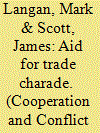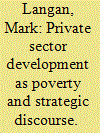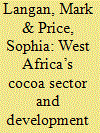|
|
|
Sort Order |
|
|
|
Items / Page
|
|
|
|
|
|
|
| Srl | Item |
| 1 |
ID:
132326


|
|
|
|
|
| Publication |
2014.
|
| Summary/Abstract |
Aid for Trade (AfT) has gained prominence as an innovative form of donor support in the 'post'-Washington Consensus. AfT mechanisms have been praised as a means of aligning trade liberalisation deals (whether in the Doha Round or within bilaterals) to poverty reduction objectives. This article, through critical analysis of AfT discourse within the 'moral economies' of multilateral World Trade Organization and bilateral European Union-African, Caribbean and Pacific negotiations, points to the strategic purposes of donor language in rationalising asymmetric North-South trade systems. Moreover, it questions the 'development' credentials of AfT assistance by examining some of the ensuing private sector activities and the impact on the supposed beneficiaries, and the tying of AfT disbursements to the implementation of inappropriate policies.
|
|
|
|
|
|
|
|
|
|
|
|
|
|
|
|
| 2 |
ID:
142545


|
|
|
|
|
| Summary/Abstract |
West African elites have successfully argued for an Economic Partnership Agreement Development Programme (EPADP) as part of free trade negotiations with the European Commission. ECOWAS officials state that the EPADP is necessary to realise the ‘development dimension’ of trade. In particular, they have (re)articulated Europe's own narratives relating to Aid for Trade and private sector development – insisting that the European Commission delivers on its promises. Accordingly, European negotiators have conceded the principle of the EPADP, stating that around €6·5 billion will be delivered. This article, however, examines the likely (in)capacity of the EPADP to meaningfully marry trade and development in the context of premature liberalisation under Economic Partnership Agreements (EPAs). Crucially, it argues that West African extraversion in terms of EPADP resources may entrench predatory elites while locking-in ECOWAS states into inequitable trade structures that re-embed poverty in the region.
|
|
|
|
|
|
|
|
|
|
|
|
|
|
|
|
| 3 |
ID:
135289


|
|
|
|
|
| Summary/Abstract |
The European Union's (EU) trade and development ‘partnership’ with the African, Caribbean, and Pacific (ACP) countries has long interested scholars of North-South relations. Historically, the theoretical literature on ACP-EU ties has been characterised by liberal institutionalist accounts of interdependence and critical assessments of Europe's neo-colonialism. In the timeframe of the Cotonou Agreement (2000–20), this division has expressed itself in relation to liberal assessments of Europe's pursuit of pro-poor market reforms in the Post-Washington Consensus and critical accounts of Europe's neoliberal ‘development’ agenda. This article argues that a moral political economy offers an innovative lens for the latter critical assessment of ACP-EU ties. With a constructivist focus on Europe's normative ‘development’ agenda, a moral economy standpoint may draw attention to the EU's role in (re)embedding poverty through recourse to legitimating ethical discourse. This is seen to enable the critical school to more closely consider ideational/discursive power in response to contemporary liberal institutionalist accounts. The article focuses on the European Investment Bank (EIB) and its activities in ACP countries – with particular focus on the Bank's Investment Facility (IF) – as an exemplar of the disjuncture between norms and outcomes.
|
|
|
|
|
|
|
|
|
|
|
|
|
|
|
|
| 4 |
ID:
102400


|
|
|
|
|
| Publication |
2011.
|
| Summary/Abstract |
Private sector development (PSD) has emerged as a core component of donor strategies aimed at making free markets work for 'the poor' through assistance to business sector capacity in low-income states. PSD initiatives cannot be understood, however, as technical exercises aimed solely at promoting development through business competitiveness. Instead they serve as normative concessions through which developmentally questionable market-opening has been rationalised by donors in pursuit of lucrative commercial opportunities in emerging economies. Examining the European Union's (EU) PSD framework in bilateral relations with the African, Caribbean and Pacific (ACP) states, the article examines the utilisation of PSD discourse in the 'development branding' of Economic Partnership Agreements (EPAs). PSD discourse is seen to facilitate a 'double-veiling' of asymmetric ACP-EU trade ties via legitimising images of equitable market-opening and the trickle-down of business wealth to 'the poor'. Nevertheless, the reality of reciprocal trade structures combined with Europe's anaemic PSD resources bears little resemblance to the strategic illusions of PSD. In particular, the interventions of Europe's Centre for the Development of Enterprise (CDE) in cotton and textiles sectors in East Africa are seen to have dubious outcomes for 'development' in ACP former colonies.
|
|
|
|
|
|
|
|
|
|
|
|
|
|
|
|
| 5 |
ID:
152801


|
|
|
|
|
| Summary/Abstract |
European officials veer towards exceptionalism in their policy communications concerning the EU’s global role, particularly in terms of African development. This article poses a rejoinder to such tendencies through examination of the rise of ‘virtuous power Turkey’ in Africa. It examines how Turkish elites constructed a moralised ‘neo-Ottoman’ foreign policy in wake of stalled EU accession. It then underscores how elites framed humanitarian interventions in sub-Saharan Africa in contrast to the perceived neo-colonialism of an EU ‘other’. In this vein, the article explores the meaning of normative ‘neo-Ottomanism’ for ostensible beneficiaries in Africa, for the EU, and for Turkey itself.
|
|
|
|
|
|
|
|
|
|
|
|
|
|
|
|
| 6 |
ID:
171245


|
|
|
|
|
| Summary/Abstract |
The EU is vigorously pursuing Economic Partnership Agreements (EPAs) in its trade and aid relations with African, Caribbean and Pacific (ACP) countries. Justifying the EPAs as being ‘development friendly’, EU officials promise that aid support to private sector development (PSD) in ACP countries will make free trade systems ‘win–win’. This article, based on the authors’ semi-structured interviews conducted in Ghana and Nigeria, examines the perspectives of cocoa stakeholders vis-à-vis EPAs and PSD. Applying critical discourse analysis to interview transcripts, it underscores areas of overlap and, crucially, divergence among cocoa stakeholders’ own narratives on PSD support in the context of EPAs and the official legitimating discourse of EU institutions. In the process, the article draws critical attention to cocoa business interviewees’ concerns regarding the impact of premature trade liberalisation. It also underscores cocoa stakeholders’ concerns that EU PSD promises are not being fulfilled in terms of actual tangible benefits for business people in this vital ACP export sector. Accordingly, the article contributes to, and corroborates, an existing critical scholarly literature which problematises the strategic functions of donor PSD discourse in presenting free trade reforms as being ‘pro-poor’ in the post-Washington Consensus.
|
|
|
|
|
|
|
|
|
|
|
|
|
|
|
|
|
|
|
|
|